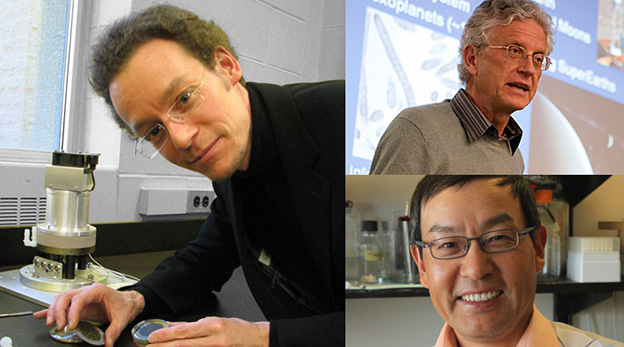Twelve McMaster research projects receive more than $2.4-million

Twelve projects that will include research on the origins of life and new technologies to monitor the elderly were awarded more than $2.4-million in infrastructure funding from the Canada Foundation for Innovation.
Among them, biophysicist Maikel Rheinstädter, theoretical astrophysicist Ralph Pudritz and biochemist Yingfu Li, will work to unravel the mystery of how the earliest form of cellular life emerged more than 3.5 billion years ago.
The trio has established the Origins of Life Laboratory, a facility unlike any other in the world.
“You need three things to create a cell,” explains Rheinstädter. “A membrane, enzymes to facilitate certain reactions, and molecules such as DNA and RNA to store information.”
Put these things together inside two unique simulation chambers that are about the size of a bar fridge, replicate the volcanic conditions on early Earth, adjust and cycle the temperature, humidity level, radiation and other factors that mimic daily and seasonal cycles, and in a matter of days the chambers will have simulated hundreds of years of primordial interactions.
Rheinstädter, the principal investigator, describes the research trio as a “dream team,” each viewing this research challenge through significantly different lenses that range from his own specialty in membrane biophysics, to Pudritz’s world-renowned expertise in planet formation, to Li’s innovative work in RNA and DNA as Canada Research Chair in Chemical Biology of Nucleic Acids.
The project was awarded $400,000 from the John Evans Leadership Fund (JELF), which is designed to help universities attract and retain the very best researchers by ensuring they have access to cutting edge equipment and facilities.
“This was a remarkably successful competition for us as we received more awards per capita than any other Canadian university and earned the second highest total number of awards,” says Allison Sekuler, acting vice-president of research. “It’s a great testament to the excellence of McMaster’s researchers, both established and emerging.”
Below are the additional researchers awarded infrastructure funding:
Jonathan Bramson, Canada Research Chair in Translational Cancer Immunology, was awarded $300,000 to research new treatments for cancer that employ patients’ white blood cells to fight their tumours.
Gerry Wright, director of the Michael G. DeGroote Institute for Infectious Disease Research, was awarded $300,000 to further his research on how to overcome antibiotic resistance.
Biologist Ian Dworkin was awarded $148,606 to examine the functional effects of subtle changes in gene function.
Qiyin Fang, Canada Research Chair in Biophotonics, received $149,036 to develop intelligent home sensor networks for the elderly. His team will work to develop sensors that can monitor physical activities and physiological parameters.
Materials science engineer Kathryn Grandfield received $61,889 to develop new methods to identify the underlying mechanisms involved in the bonding of implant materials to bone. Specifically, she will study the interactions between natural and man-made biomaterials at the nanoscale, focused on improving orthopaedic and dental implant technologies.
Lesley MacNeil, biochemistry and biomedical sciences, was awarded $144,487. She will use nematodes or roundworms to study two environmental factors – diet and microbiota – and how these factors interact with disease mutations.
Andrew McArthur , an assistant professor in biochemistry and biomedical sicences, will use his $34,245 award to establish a new bioinformatics laboratory to integrate functional genomics, biocuration, and analytics in biomedical research.
Anthropologist Shanti Morell-Hart’s was awarded $80,000 to investigate transformations in past environments, human causes of these shifts, and societal responses to ecological change. Her archaeological research will map long-term changes in human-environmental relations through patterns of plant residues at ancient Mayan sites.
Sukhvinder Obhi , associate professor of psychology, will use his $226,111 award for exploring the neurocognitive bases of social behaviour. He will examine whether a particular system in the human brain known as the human mirror system (HMS) causes social mimicry, and whether a particular factor that is known to affect social relationships – power – also has effects on the HMS and social mimicry.
Mechanical engineering professor Stephen Veldhuis, director of the McMaster Manufacturing Research Institute has won $398,380 to improve the performance of tooling using an integrated coating strategy involving material and process parameter optimization.
Ryan Wylie, assistant professor of chemistry and chemical biology, was awarded $197,972 award to develop synthetic mimics of the extracellular matrix (ECM) – the microenvironment that surrounds cells and provides structural and chemical cues. The understanding of cell-matrix interactions will lead to the development of targeted cancer therapies as well as regenerative therapies after cardiac arrest and stroke.

